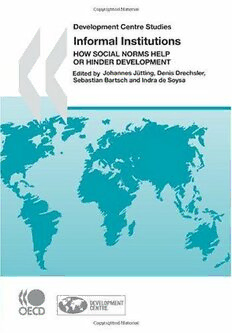Download Development Centre Studies Informal Institutions: How Social Norms Help or Hinder Development (Development Centre Studies) (Development Centre Studies) PDF Free - Full Version
Download Development Centre Studies Informal Institutions: How Social Norms Help or Hinder Development (Development Centre Studies) (Development Centre Studies) by Johannes P. Jutting, Denis Drechsler, Sebastian Bartsch, Indra De Soysa in PDF format completely FREE. No registration required, no payment needed. Get instant access to this valuable resource on PDFdrive.to!
About Development Centre Studies Informal Institutions: How Social Norms Help or Hinder Development (Development Centre Studies) (Development Centre Studies)
Informal institutions family and kinship structures, traditions, and social norms not only matter for development, but they are often decisive factors in shaping policy outcomes in environments of weak states and poor governance structures. Based on concrete examples in the areas of gender equality, governance and private sector development, this book advocates a pragmatic way of dealing with informal institutions. Neither the romantic preservationist nor the bulldozing moderniser approach promises an adequate solution. Incorporating informal institutions in development strategies whether by taking advantage of them in their existing state, by seeking to optimise their impact or by providing incentives to change them will be instrumental in improving development outcomes, including achieving the Millennium Development Goals. Table of Content : Foreword Preface Opening Remarks by the Secretary-General of the OECD Introduction and Overview by Johannes J????tting, Denis Drechsler, Sebastian Bartsch, and Indra de Soysa PART I. INFORMAL INSTITUTIONS; FRIEND OR FOE OF DEVELOPMENT? Chapter 1. A Policy Perspective from South Africa by Susan van der Merwe Chapter 2. Informatl Institutions and Development: How They Matter and What Makes Them Change by Indra de Soysa and Johannes J????tting In Focus: Defining (Informal) Institutions by Jante Parlevliet PART II. INFORMAL INSTITUTIONS IN THREE KEY AREAS OF DEVELOPMENT: GENDER EQUALITY, GOVERNANCE, AND PRIVATE SECTOR DEVELOPMENT Chapter 3. Informal Institutions and Gender Equality by Gita Sen In Focus: The OECD Gender, Institutions and Development Data Base by Denis Drechsler Discussion Report: Gender Equality by Laila Abdallah Chapter 4. Governance and Accountability: How Do the Formal and Informal Interplay and Change? by Nils Boesen In Focus: Governance Indicators and Informal Institutions by Charles Oman Discussion Report: Governance, Accountability and Capacity Development by Nicolas Meisel Chapter 5. Private Sector Development: How Business Interacts with Informal Institutions by Stephen Nicholas and Elizabeth Maitland In Focus: Growth of the Tanzanian Firm Sector: The Role of Formal and Informal Institutions by Marion J. Eeckhout Discussion Rerport: Private Sector Development by Felicity Proctor PART III. WHAT HAVE WE LEARNED AND WHAT CAN WE DO? Chapter 6. Policy Implications: A DAC Perspective on Donor Policy and Practice by richard Manning and Eduard Westreicher Chapter 7. Conclusions and Outlook by Johannes J????tting, Denis Drechsler, Sebastian Bartsch, and Indra de Soysa Programme List of Authors List of Participants
Detailed Information
| Author: | Johannes P. Jutting, Denis Drechsler, Sebastian Bartsch, Indra De Soysa |
|---|---|
| Publication Year: | 2007 |
| ISBN: | 9264039066 |
| Pages: | 178 |
| Language: | English |
| File Size: | 0.809 |
| Format: | |
| Price: | FREE |
Safe & Secure Download - No registration required
Why Choose PDFdrive for Your Free Development Centre Studies Informal Institutions: How Social Norms Help or Hinder Development (Development Centre Studies) (Development Centre Studies) Download?
- 100% Free: No hidden fees or subscriptions required for one book every day.
- No Registration: Immediate access is available without creating accounts for one book every day.
- Safe and Secure: Clean downloads without malware or viruses
- Multiple Formats: PDF, MOBI, Mpub,... optimized for all devices
- Educational Resource: Supporting knowledge sharing and learning
Frequently Asked Questions
Is it really free to download Development Centre Studies Informal Institutions: How Social Norms Help or Hinder Development (Development Centre Studies) (Development Centre Studies) PDF?
Yes, on https://PDFdrive.to you can download Development Centre Studies Informal Institutions: How Social Norms Help or Hinder Development (Development Centre Studies) (Development Centre Studies) by Johannes P. Jutting, Denis Drechsler, Sebastian Bartsch, Indra De Soysa completely free. We don't require any payment, subscription, or registration to access this PDF file. For 3 books every day.
How can I read Development Centre Studies Informal Institutions: How Social Norms Help or Hinder Development (Development Centre Studies) (Development Centre Studies) on my mobile device?
After downloading Development Centre Studies Informal Institutions: How Social Norms Help or Hinder Development (Development Centre Studies) (Development Centre Studies) PDF, you can open it with any PDF reader app on your phone or tablet. We recommend using Adobe Acrobat Reader, Apple Books, or Google Play Books for the best reading experience.
Is this the full version of Development Centre Studies Informal Institutions: How Social Norms Help or Hinder Development (Development Centre Studies) (Development Centre Studies)?
Yes, this is the complete PDF version of Development Centre Studies Informal Institutions: How Social Norms Help or Hinder Development (Development Centre Studies) (Development Centre Studies) by Johannes P. Jutting, Denis Drechsler, Sebastian Bartsch, Indra De Soysa. You will be able to read the entire content as in the printed version without missing any pages.
Is it legal to download Development Centre Studies Informal Institutions: How Social Norms Help or Hinder Development (Development Centre Studies) (Development Centre Studies) PDF for free?
https://PDFdrive.to provides links to free educational resources available online. We do not store any files on our servers. Please be aware of copyright laws in your country before downloading.
The materials shared are intended for research, educational, and personal use in accordance with fair use principles.

